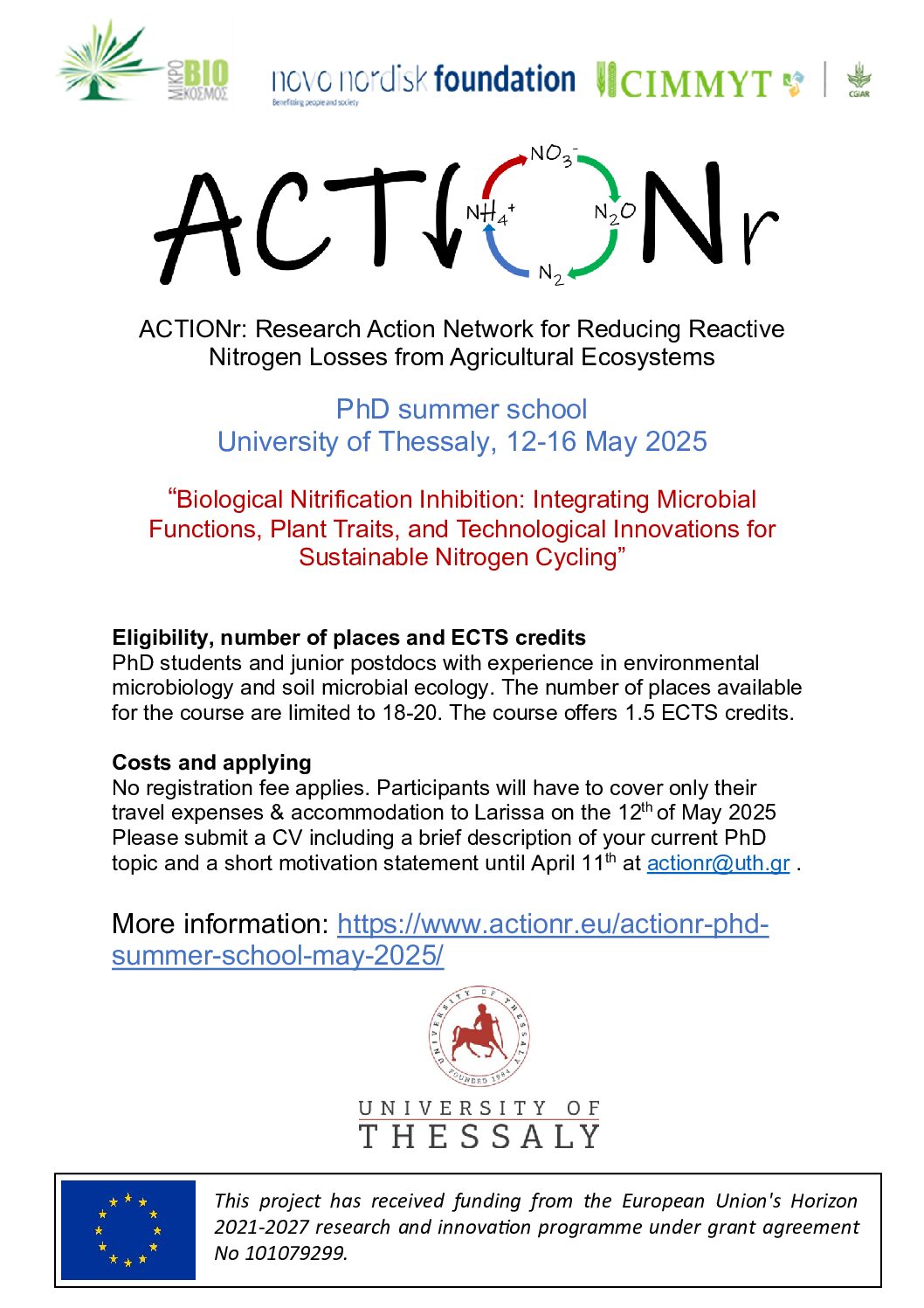
Copenhagen, Denmark
International Health
When:
04 August - 22 August 2025
Credits:
5 EC
Read more
Environmental Studies & Life Sciences Spring Course
When:
12 May - 16 May 2025
School:
Institution:
University of Thessaly
City:
Country:
Language:
English
Credits:
1.5 EC

This summer school aims to provide an overview of the Biological Nitrification Inhibition (BNI) and its role in regulating nitrogen cycling in soil systems. Through lectures by leading scientists in the fields of environmental microbiology, microbial ecology, plant biotechnology, and soil biogeochemistry, participants will explore the mechanisms underlying BNI, the physiological and ecological roles of ammonia-oxidizing microorganisms, and the potential for harnessing plant metabolic pathways and traits to improve nitrogen use efficiency. The course will also examine how plant-derived nitrification inhibitors can contribute to sustainable nitrogen management and mitigate nitrogen losses in agricultural systems. Theoretical sessions will be complemented by practical training, including high-throughput screening methods for BNI activity, amplicon sequencing techniques for microbial community analysis, and key aspects of big data analysis. Participants will be introduced to essential concepts for handling large biological datasets, covering principal component analysis (PCA) plots and clustering methods as fundamental tools for the interpretation of data related to BNI mechanisms and microbial interactions. Additionally, participants will explore novel approaches, such as soil phage therapy for microbial nitrogen cycling management, as well as strategies for breeding crops with enhanced BNI capacity. The program will feature discussions on the application of BNI in agricultural systems, highlighting current industry perspectives and future research directions. Lectures and laboratory sessions will provide participants with hands-on experience in state-of-the-art methodologies for assessing BNI activity and its interactions with microbial communities
University of Thessaly
PhD students and junior postdocs with experience in environmental microbiology and ecology. Knowledge of nitrogen cycling and microbial physiology is advantageous but not required. The course has a capacity of 18–20 participants
By the end of the course, participants will:
• Gain insights into the physiological and ecological roles of ammonia-oxidizing microorganisms and their interactions with plants
• Learn how plant metabolic pathways and traits contribute to improving nitrogen use efficiency and sustainable agricultural practices
• Develop hands-on experience with high-throughput screening methods for BNI activity and amplicon sequencing techniques for analyzing microbial communities
• Gain practical skills in working with big data workflows for analyzing and interpreting large biological datasets related to the impact of BNI on the nitrogen cycle
• Gain knowledge of novel strategies for managing microbial nitrogen cycling, including soil phage therapy
• Learn the latest industry perspectives on BNI applications in agricultural systems and the potential for breeding crops with enhanced BNI capacity
When:
12 May - 16 May 2025
School:
Institution:
University of Thessaly
Language:
English
Credits:
1.5 EC

Copenhagen, Denmark
When:
04 August - 22 August 2025
Credits:
5 EC
Read more

Iasi, Romania
When:
14 July - 20 July 2025
Credits:
4 EC
Read more

Maastricht, Netherlands
When:
14 July - 18 July 2025
Credits:
2 EC
Read more